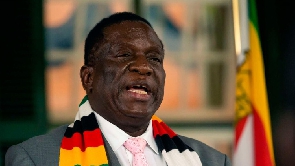 Zimbabwe President Emmerson Mnangagwa
Zimbabwe President Emmerson Mnangagwa
Rights activists and opposition groups in Zimbabwe say President Emmerson Mnangagwa's signing a so-called law "Patriotic Bill" is a grave attack on fundamental freedoms and rights.
The new law authorizes harsh penalties, including the death penalty, for anyone found guilty of "willfully damaging the sovereignty and national interest of Zimbabwe."
Zimbabwe’s main opposition party and human rights groups are calling Mnangagwa to repeal the bill he signed into law last Friday.
“We condemn their signing into law of the unconstitutional ‘Patriotic Bill’, which will criminalize free speech and freedom of association which are protected under our constitution,” said Fadzayi Mahere, spokesman for Citizens Coalition for Change.
“The introduction of this repressive legislation confirms beyond any doubt that Mnangagwa is worse than Robert Mugabe and Zimbabwe as become a full-blown dictatorship in an outpost of tyranny.”
Mahere called on Zimbabweans to, as he put it, “vote decisively for change” in the August 23 general election.
Obert Masaraure is spokesman for another rights group, the Crisis Coalition of Zimbabwe. His group says the new law is vague in its definition of offenses.
“Some of the penalties proposed by the law for deliberately injuring the sovereignty and national interests of Zimbabwe, such as the death penalty, long imprisonment, loss of citizenship and binding of persons from electoral participation for five years, are too harsh and inappropriate for vaguely defined offenses,” he said.
“The provision of the death penalty means that the new law violates the constitution which only allows for the death penalty in cases of murder and aggravating circumstances. We firmly oppose the death penalty without exceptions. We are completely against the death penalty, and we condemn it and unreservedly.”
Amnesty International said the new law is evidence that Zimbabwean authorities are “bent on closing civic space as well as suppressing any form of dissent”.
But Rutendo Matinyarare, chairman of the pro-government Zimbabwe Anti-Sanctions Movement, has a different view.
“I'm over the moon because of the fact that the president is finally signed this criminal law amendment,” Matinyarare said.
“And I'm happy because I was one of the people that proposed the Patriotic Bill,” he added.
Matinyarare said his group is pleased about laws that punish people who advocate for sanctions and call for the invasion of the country and stabilization of the country.
“It puts us in step with other nations across the world that have similar laws,” Matinyarare said. “Let's hope it deters people and unites Zimbabweans to not sabotage their own country.”
Mnangagwa and the ruling Zanu-PF party have pushed for years for an end to Western sanctions against Zimbabwean leaders.
The sanctions were imposed during the rule of the late Robert Mugabe for human rights violations and alleged election rigging.
Mnangagwa has not commented on the law, known as the Criminal Law Codification and Reform Amendment Act, since he signed it into law last week.